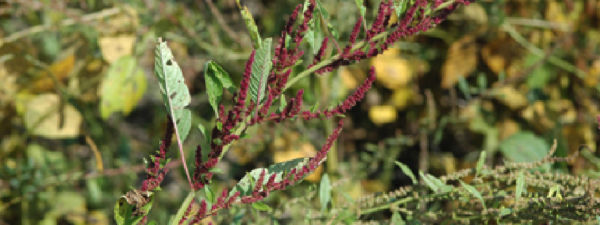Best Practices to Manage Glyphosate-Resistant Weeds
July 25, 2018

Glyphosate resistance continues to impact growers across the Midwest. Without proper management, aggressively resistant weed species, such as waterhemp, Palmer amaranth and marestail, can quickly turn productive fields into a lost cause.
Increased resistance to glyphosate is part of a larger trend toward growing weed resistance to herbicides, including ALS inhibitors, triazines, PPO inhibitors and HPPD inhibitors. Multiple herbicide resistance in weed population sites, as well as cross-resistance – resistance to herbicides that are from different chemical families, but share the same site of action – is a real concern.
The Impact of Ignoring Resistance
Palmer amaranth and other glyphosate-resistant weeds can completely devastate yields. Left uncontrolled, a single glyphosate-resistant Palmer amaranth plant can deposit as many as 1 million seeds into the soil seedbank.1
In one university report, Palmer amaranth seeds collected from a St. Joseph County, Michigan, soybean field were confirmed resistant to glyphosate, and some of those resistant Palmer amaranth plants survived a 32X rate of glyphosate.2
Other weed species – including waterhemp and marestail – have also shown aggressive resistance. This serious threat of economic losses from glyphosate-resistant weeds highlights the need to consider alternatives.
Experts agree that a goal of zero tolerance for the distribution of seeds by resistant weeds can aid in management. Growers have proven options for fighting back and protecting profits. Implement best management practices and adopt a zero-tolerance approach.
Start with a Pre-emergence Herbicide
For optimal yields, growers should start with clean fields. That means starting with a pre-emergence residual herbicide. To sustainably manage weeds, implement a well-planned herbicide program that employs multiple sites of action, including the use of an SOA with residual activity.
Corn is particularly sensitive to early season weed competition. High-weed-density research during weed competition variety trials recorded a 20- to 40-bushel-per-acre yield loss – even when glyphosate was first applied two to three weeks after corn and weed emergence.3
Corvus® herbicide (Groups 2, 27) has overlapping sites of action to control early season problem weeds. A wide application window allows for application from pre-plant to early postemergence at V2, making it an effective, long-lasting first-pass herbicide in a two-pass system.
Stay Clean with a Post-emergence Application
For a zero tolerance approach in corn, include DiFlexx® DUO herbicide in your second pass. DiFlexx DUO provides excellent, strong post-emergence control against a full range of tough weeds, especially glyphosate-resistant ones. In addition, DiFlexx DUO delivers built-in resistance management with its two effective sites of action (Groups 4, 27) and exhibits excellent crop safety.
Additional Resources
Before applying any herbicide, make sure to read the entire label to get the best possible results and confirm that the product's chemistry is effective on the weeds you wish to control. Not every product is suitable for every situation, nor registered in every state, and proper application of any herbicide is essential to maximize control.
Sources:
1. “WSSA Fact Sheet About Weed Seeds and Their Longevity.” 2016. http://wssa.net/wp-content/uploads/Weed-Seed-Factsheet-2016.pdf
2. Sprague, Christy. “Glyphosate-Resistant Palmer Amaranth in Michigan: Confirmation and Management Options.” Feb. 2012 https://www.canr.msu.edu/weeds/extension/factsheets/Palmer-Glyphosate-Confirmation-Feb12.pdf
3. Rosenberg, Mark. “Effect of Weed Competition on Corn.” June 2013 igrow.org/agronomy/corn/effect-of-weed-competition-on-corn/
©2019 Bayer CropScience LP, 2 T.W. Alexander Drive, Research Triangle Park, NC 27709. Always read and follow label instructions. Bayer, the Bayer Cross, Corvus and DiFlexx are registered trademarks of Bayer. Corvus is a Restricted Use Pesticide. Corvus is not registered in all states. For additional product information call toll-free 1-866-99-BAYER (1-866-992-2937) or visit our website at www.CropScience.Bayer.us